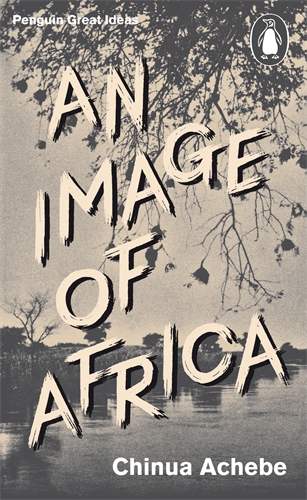
An Image of Africa book by Chinua Achebe
By Chinua AchebeAn Image of Africa book by Chinua Achebe
Beautifully written yet highly controversial, An Image of Africa asserts Achebe's belief in Joseph Conrad as a 'bloody racist' and his conviction that Conrad's novel Heart of Darkness only serves to perpetuate damaging stereotypes of black people. Also included is The Trouble with Nigeria, Achebe's searing outpouring of his frustrations with his country.
Book details
- Paperback
- 112 pages
- English
- 0141192585
- 9780141192581
About Chinua Achebe
chinua achebe was a novelist, poet, professor at brown university and critic. he is best known for his first novel, things fall apart (1958), which is the Read More about Chinua Achebe
More Books By Chinua Achebe
3% OFF

The African Trilogy: Things Fall Apart, No Longer at Ease, Arrow of God by Chinua Achebe
New Book
Ksh 5,690
Ksh 5,890
Buy Now
7% OFF

The Education of a British-Protected Child book by Chinua Achebe
New Book
Ksh 2,800
Ksh 3,000
Buy Now
People who bought this also bought
3% OFF

Why Should Anyone Be Led by You?: What It Takes To Be An Authentic Leader book by Rob Goffee , Gareth R. Jones
New Book
Ksh 3,250
Ksh 3,350
Buy Now
3% OFF

Startup Rising: The Entrepreneurial Revolution Remaking the Middle East book by Christopher M. Schroeder
New Book
Ksh 3,390
Ksh 3,490
Buy Now
3% OFF

Peoplewatching: The Desmond Morris Guide to Body Language book by Desmond Morris
New Book
Ksh 3,350
Ksh 3,450
Buy Now
2% OFF

The Rational Male - The Players Handbook: A Red Pill Guide to Game book by Rollo Tomassi
New Book
Ksh 5,700
Ksh 5,800
Buy Now
3% OFF

Dancing Wu Li Masters: An Overview of the New Physics book by Gary Zukav
New Book
Ksh 3,000
Ksh 3,100
Buy Now
3% OFF

The Dragon's Gift: The Real Story of China in Africa book by Deborah Brautigam
New Book
Ksh 3,660
Ksh 3,760
Buy Now
3% OFF

Skin in the Game: The Hidden Asymmetries in Daily Life book by Nassim Nicholas Taleb
New Book
Ksh 3,160
Ksh 3,260
Buy Now
3% OFF

Flow: The Psychology of Happiness book by Mih�ly Cs�kszentmih�lyi
New Book
Ksh 3,650
Ksh 3,750
Buy Now
3% OFF

Bounce: The Art of Turning Tough Times into Triumph book by Keith McFarland
New Book
Ksh 3,650
Ksh 3,750
Buy Now
6% OFF

Farsighted: How We Make the Decisions that Matter the Most book by Steven Johnson
New Book
Ksh 3,200
Ksh 3,390
Buy Now
3% OFF

A Profound Mind: Cultivating Wisdom in Everyday Life book by Dalai Lama
New Book
Ksh 2,800
Ksh 2,900
Buy Now
3% OFF

The Checklist Manifesto: How to Get Things Right book by Atul Gawande
New Book
Ksh 2,990
Ksh 3,090
Buy Now
4% OFF

Lost History: The Enduring Legacy of Muslim Scientists, Thinkers, and Artists book by Michael Hamilton Morgan
New Book
Ksh 2,650
Ksh 2,750
Buy Now
3% OFF

The Moment of Lift: How Empowering Women Changes the World book by Melinda Gates
New Book
Ksh 2,890
Ksh 2,990
Buy Now
2% OFF

The House of Morgan: An American Banking Dynasty and the Rise of Modern Finance book by Ron Chernow
New Book
Ksh 4,600
Ksh 4,700
Buy Now
